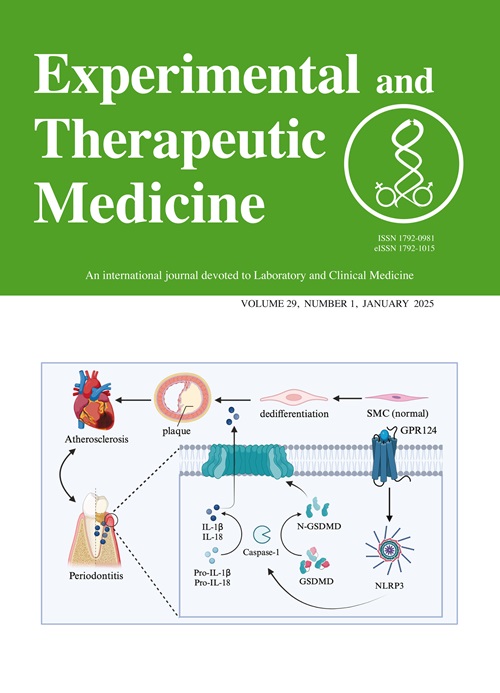免疫检查点分子PD - L1和PD - 1在EBV相关淋巴细胞增生性疾病中的表达:一项荟萃分析
IF 2.3
4区 医学
Q3 MEDICINE, RESEARCH & EXPERIMENTAL
引用次数: 0
摘要
Epstein - Barr病毒(EBV)与多种淋巴细胞增生性疾病的发展有关。在这一过程中,程序性细胞死亡1 (PD‑1)/程序性细胞死亡配体1 (PD‑L1)的作用仍有待阐明。对20项研究进行了荟萃分析,并使用95%置信区间(ci)的风险比(rr)来评估PD‑L1/PD‑1表达与EBV感染状态之间的关系。结果显示,EBV+病例PD‑L1在肿瘤细胞中的表达水平显著升高,合并RR为2.26 (95% CI, 1.63 ~ 3.14;P<0.01),尤其是弥漫性大B细胞淋巴瘤(DLBCL)和经典霍奇金淋巴瘤亚型。同样,EBV感染增加了免疫细胞中PD‑L1的表达,合并RR为2.20 (95% CI, 1.55‑3.12;术中,0.01)。在DLBCL和移植后淋巴增生性疾病亚型中,EBV+病例中免疫细胞中PD - L1的表达增加。关于PD - 1在肿瘤浸润淋巴细胞(til)中的表达水平,EBV感染与PD - 1表达无显著性差异,合并RR为1.10 (95% CI, 0.81 ~ 1.48;P> 0.05)。本荟萃分析表明,在EBV相关的淋巴增生性疾病中,EBV感染与肿瘤细胞和免疫细胞中PD‑L1的表达水平相关,但与til中PD‑1的表达无关。本文章由计算机程序翻译,如有差异,请以英文原文为准。
Expression of the immune checkpoint molecules PD‑L1 and PD‑1 in EBV‑associated lymphoproliferative disorders: A meta‑analysis
Epstein‑Barr virus (EBV) has been implicated in the development of a wide range of lymphoproliferative disorders. In this process, the role of programmed cell death 1 (PD‑1)/programmed cell death ligand 1 (PD‑L1) has remained to be clarified. A meta‑analysis of 20 studies was performed and risk ratios (RRs) with 95% confidence intervals (CIs) were used to evaluate the association between PD‑L1/PD‑1 expression and the status of EBV infection. The results showed that the expression level of PD‑L1 in tumor cells was significantly higher in EBV+ cases with a pooled RR of 2.26 (95% CI, 1.63‑3.14; P<0.01), particularly in subtypes of diffuse large B‑cell lymphoma (DLBCL) and classical Hodgkin lymphoma. Similarly, EBV infection increased the expression of PD‑L1 in immune cells with a pooled RR of 2.20 (95% CI, 1.55‑3.12; P<0.01). In subtypes of DLBCL and post‑transplant lymphoproliferative disorder, the expression of PD‑L1 in immune cells is increased in EBV+ cases. Regarding the expression level of PD‑1 in tumor‑infiltrating lymphocytes (TILs), no significance was found between EBV infection and PD‑1 expression, with a pooled RR of 1.10 (95% CI, 0.81‑1.48; P>0.05). The present meta‑analysis demonstrated that in EBV‑associated lymphoproliferative disorders, EBV infection was associated with the expression level of PD‑L1 in tumor cells and immune cells but was not associated with the expression of PD‑1 in TILs.
求助全文
通过发布文献求助,成功后即可免费获取论文全文。
去求助
来源期刊

Experimental and therapeutic medicine
MEDICINE, RESEARCH & EXPERIMENTAL-
CiteScore
1.50
自引率
0.00%
发文量
570
审稿时长
1 months
期刊介绍:
 求助内容:
求助内容: 应助结果提醒方式:
应助结果提醒方式:


